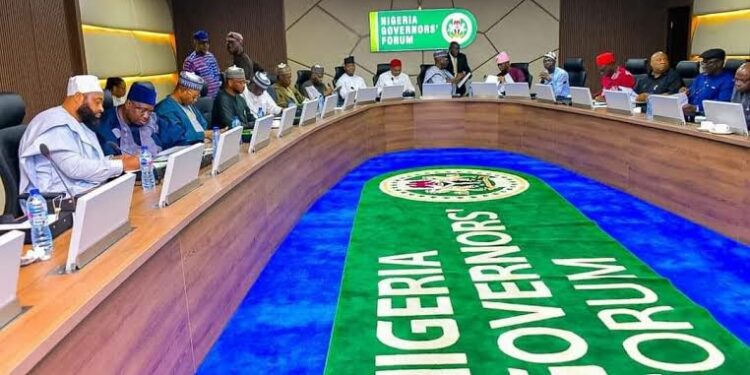The difficulty of enforcing the minimum wage could bankrupt numerous states while the country waits for the new rate that President Bola Tinubu has promised to send to the National Assembly.
During its meeting on Tuesday, the Federal Executive Council decided to withdraw a memo about the tripartite committee’s report on the new minimum wage. This was done to facilitate further discussions between the federal and state governments, the business sector, and labour unions.
Vice President Kashim Shettima chaired the National Economic Council meeting last Thursday, where Tinubu met with the governors. The national minimum wage was supposed to be the topic of discussion at the meeting, yet it said nothing about it.
The communiqué from the Southern Governors’ Forum, which met in Abeokuta, Ogun State, was also made public last Thursday. In it, the governors requested that each state negotiate a minimum salary with its labour force.
However, the Nigeria Governors’ Forum’s position on their excessive influence on the minimum wage negotiations has prompted a response from the trade unions.
The research claims that by 2022, Abia, Ekiti, Gombe, Imo, Katsina, Kogi, Oyo, Plateau, Sokoto, Yobe, and Zamfara would all be in deficit due to ongoing expenses.
According to the research, if recurrent expenditures were to increase by 50%, 13 states would experience a deficit, leaving only 10 states with healthy finances.
Based on the fiscal data for 2022, the tripartite committee recommended a minimum wage of N62,000, which would require an increase of more than 100% from the current N30,000. This could result in only a few states having positive net revenues, including Anambra, Bayelsa, Borno, Ebonyi, Gombe, Imo, Jigawa, Kaduna, Lagos, and Rivers.
The amount left over after deducting ongoing expenses from the state’s overall revenue is known as net revenue. It indicates a surplus when it is positive and a deficit when it is negative.
Additionally, the monthly revenue from the Federal Account Allocation Committee, internal revenue, grants and aid, and constituency development money are used to determine the total revenue of the states.
Per the documents obtained by The PUNCH, Abia pays a monthly salary of N5,837,899,980.40 to about 58,631 workers. With 20,541 employees, Anambra pays N1,824,851,308.96 in compensation each month. In addition, N894,480,399.62 is paid towards pension obligations, and N579,694,680.33 is used to pay down debt.
With a workforce of 48,213 and monthly expenses of N5,802,435,178.58, including N1,194,528,784.40 for pension obligations and N3,535,787,992.48 for debt servicing, Bayelsa’s total recurring spending is N10,532,751,955.46.
With 13,366 workers, Benue pays N2,040,184,471.85 in wages, N76,838,634.62 for pensions, and N64,685,126,826.08 for debt service each month, for a total of N66,802,149,932.56.
With roughly 50,871 employees, Delta pays N8,973,081,853.50 in salary, N1,499,886,303.39 in pensions, and N72,417,433,139.00 in debt service each month, for a total of N82,890,401,295.89.
About 44,831 people are employed by Jigawa, which pays N2,795,662,113.02 in salary and N345,987,843.12 in pensions, for a total of N3,141,649,956.14 in recurrent expenses per month.
There are 19,062, 36,048, and 22,225 workers in Katsina, Kwara, and Niger, respectively, with monthly recurrent expenditures of N139,294,944,565.27, N4,457,268,675.54, and N2,653,614,213.35.
In contrast to its total revenue of N147,637,730,867.73, Abia has total recurrent expenses of N111,983,979,958.62, according to the document.
Adamawa’s total revenue is N109,722,949,684.65, while its recurring expenditure is N70,369,399,885.57. In contrast, Akwa Ibom has a high revenue of N444,288,683,000, with recurrent expenditure of N235,144,539,000.
With a total revenue of N1,243,778,878,170 in 2022 and a recurring expenditure of N621,043,036,000, Lagos is the state with the greatest total revenue among the others. Delta is the next state with N702,020,717,460.08 and a recurrent expenditure of N377,905,100,451.83.
Rivers earned N525,588,159,714.88 in 2022 and spent N186,974,715,774.87 on recurrent expenses; Kaduna earned N222,349,875,000 and spent N95,987,999,472.10; Ogun earned N297,249,009,626.83 and spent N178,519,010,628.42 on recurrent expenses; and Oyo earned N247,156,776,739.70 in total and spent N152,077,804,384.65.
With N92,132,444,588.16 in total revenue and N57,601,464,374.96 in recurrent spending, Kebbi State had the lowest total revenue in 2022. Taraba came in second with N101,177,283,069.87 in total revenue and N75,055,201,412.62 in recurrent expenditure.
In addition to FAAC allocation, the NGF Secretariat’s 2022 statistics revealed low IGR in a few states.
Following Zamfara State with N6,513,960,477.20, Kebbi with N8,630,767,122.96, Taraba with N9,744,331,840.01, and Yobe State with N9,940,554,642.00 were the next highest earners.
The revenue position of the following states was also poor: Niger (N14,427,373,136.00), Benue (N15,021,223,729.38), Katsina (N12,821,119,042.64), Adamawa (N13,175,774,969.53), Plateau (N15,927,001,739.90), and Imo (N16,711,346,111.18).
Since the N30,000 minimum wage was passed into law in 2019, 15 states have not yet implemented it for their workers, according to a PUNCH story published on October 19, 2023.
Although the minimum salary of N30,000 has not yet been implemented in 15 states, BudgiT reports that the 36 states in the federation increased their cumulative personnel costs by 13.44%, from N1.54tn in 2021 to N1.75tn in 2022.











